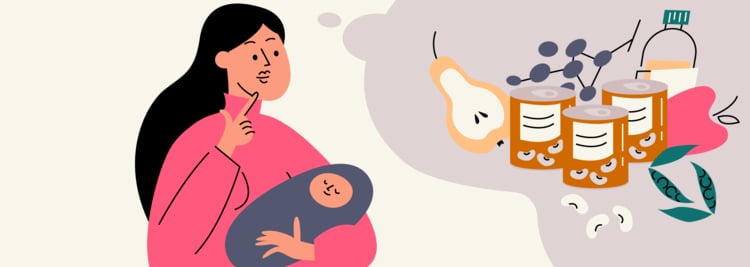Parents naturally want to do everything they can to keep their baby healthy and happy. A significant component of a healthy pregnancy is what you eat while you’re pregnant. Similarly, what you eat while you’re breastfeeding is also important. Keep reading for a detailed description of the foods to avoid while breastfeeding.
-
Tracking cycle
-
Getting pregnant
-
Pregnancy
-
Help Center
-
Flo for Partners
-
Anonymous Mode
-
Flo app reviews
-
Flo Premium New
-
Secret Chats New
-
Symptom Checker New
-
Your cycle
-
Health 360°
-
Getting pregnant
-
Pregnancy
-
Being a mom
-
LGBTQ+
-
Quizzes
-
Ovulation calculator
-
hCG calculator
-
Pregnancy test calculator
-
Menstrual cycle calculator
-
Period calculator
-
Implantation calculator
-
Pregnancy weeks to months calculator
-
Pregnancy due date calculator
-
IVF and FET due date calculator
-
Due date calculator by ultrasound
-
Medical Affairs
-
Science & Research
-
Pass It On Project New
-
Privacy Portal
-
Press Center
-
Flo Accuracy
-
Careers
-
Contact Us
Foods to Avoid While Breastfeeding: 5 Foods That Decrease Milk Supply


Every piece of content at Flo Health adheres to the highest editorial standards for language, style, and medical accuracy. To learn what we do to deliver the best health and lifestyle insights to you, check out our content review principles.
How what you eat while breastfeeding may affect your baby
While there aren’t necessarily specific foods you must eat while breastfeeding to stay healthy, making overall wholesome decisions in your diet is important. Additionally, there are foods to avoid when nursing and foods that decrease milk supply.
When you’re breastfeeding, you’re transferring nutrients via your milk to your baby. These essential nutrients will help your baby grow and be healthy. Breastfeeding can also be very draining for your body, so you may need to eat more to keep up your energy levels. An average woman requires 2,000 to 2,500 kilocalories per day. That amount increases by 500 kilocalories per day if you’re breastfeeding.
Of course, every mother is different, and so the additional calories required can vary widely from woman to woman. Factors that influence how many calories mothers need while breastfeeding include age, activity level, body mass index, and frequency of breastfeeding. For example, someone who’s exclusively breastfeeding will need to increase their calories more than someone who’s choosing a combination of breastfeeding and formula.
For more specific information on vitamins, minerals, and calories needed while breastfeeding, you can use the US Department of Agriculture My Plate Daily Checklist for reference.
When supplementing your diet with the extra calories, it’s essential to make healthy decisions. As much as possible, make sure those extra calories are coming from nutrient-dense foods such as yogurt, fruits, vegetables, and whole grains.
Mothers on special diets, such as vegetarians, may need to take vitamin and mineral supplements while breastfeeding. Vegetarians and vegans don’t receive enough B12 in their everyday diet. If you eat a plant-based diet, make sure to include B12 vitamins so your baby also gets enough B12. A B12 deficiency can result in neurological damage. The American Dietetic Association recommends that vegan/vegetarian mothers supplement their diets with B12 throughout pregnancy and while breastfeeding.
Foods to avoid while breastfeeding
Including a variety of diverse, healthy foods provides the opportunity of getting the most nutrients from food. Here are a few things you might want to ask your doctor about avoiding while breastfeeding.
Seafood
Fish is an excellent source of protein and provides many essential nutrients, such as omega-3 fatty acids. However, seafood might be one of the foods to avoid when breastfeeding. Almost all seafood contains trace amounts of mercury. When you eat fish, the mercury can transfer to your baby through breast milk. Mercury can negatively affect the infant’s brain and nervous system.
However, breastfeeding mothers can still eat fish. One of the ways you can reduce the risk of mercury is by eating a variety of fish. It’s also a good idea to avoid seafood that’s high in mercury, such as king mackerel, tilefish, and swordfish. Lastly, if eating fish from local waters, check fish advisories for that area first. When eating local water fish, it’s best to limit your intake to one portion of 6 ounces and avoid seafood for the rest of the week.
Take a quiz
Find out what you can do with our Health Assistant
Cow’s milk
The most common milk protein allergy (MPA) is cow’s milk protein allergy (CMPA). Typically, infants display signs of CMPA during their first year. MPA is quite standard in infancy and can affect as many as 15 percent of all newborns. Mothers have to watch their babies for symptoms of the allergy.
Testing for an allergy includes the elimination and reintroduction of the suspected allergen into the diet. If a baby is showing signs of CMPA, the mother will have to alter her diet and switch to other milk alternatives such as plant-based milk. Mothers who are giving their infants formula may need to make a formula change, as cow’s milk is present in many baby formulas. However, there are many alternative formula options for babies with CMPA.
Drinks to avoid while breastfeeding
What you drink while you’re breastfeeding is just as important as what you eat. In general, it’s a good idea to avoid or limit your consumption of alcohol and caffeine while you’re breastfeeding.
Alcohol
Any amount of alcohol in your breast milk can be harmful to your baby. When consuming alcohol, wait until the alcohol clears your system before breastfeeding again. Generally speaking, it takes two to three hours for the following drinks to leave your system:
- 12 ounces of 5-percent beer
- 5 ounces of 11-percent wine
- 1.5 ounces of 40-percent liquor
However, this will vary from mother to mother, depending on body weight.
You can feed your baby breast milk that you’ve pumped in advance or switch to formula during the waiting period. The “pump and dump” method doesn’t eliminate alcohol from your body any faster.
Caffeine

After going through a nine-month pregnancy without caffeine, some mothers may be looking forward to their morning cup of coffee. While mothers can have caffeine, they should limit their total consumption to two to three cups per day. This includes coffee, sodas, energy drinks, and caffeinated tea.
In small amounts, caffeine shouldn’t affect the baby. However, caffeine can transfer from the mother to the baby via breast milk and interfere with the baby’s sleep in larger quantities. Mothers who drink a lot of caffeine (10 cups or more) report that their babies show signs of fussiness, jitteriness, irritability, and poor sleeping patterns.
How to understand if what you eat is bothering your baby
Specific choices in your diet can cause your baby to have an allergic reaction or become irritable. Watch for signs of your infant developing a rash, diarrhea, congestion, or fussiness immediately after nursing. In these instances, talk with your doctor.
If you think you know what part of your diet is affecting your baby, try the elimination process. For one week, avoid that food or drink and see if there’s any difference in your infant’s behavior. The most common foods that cause allergies include cow’s milk, soy, wheat, eggs, corn, and peanuts.
Watch for signs of your infant developing a rash, diarrhea, congestion, or fussiness immediately after nursing. In these instances, talk with your doctor.
Additionally, some foods make breastfed babies gassy. Some women report seeing a reaction in their babies after eating spicy or gassy foods (such as onions, cabbage, and kale). However, there is no scientific research that has verified this claim.
Try keeping a food diary of everything you drink and eat. As each day goes by, make notes of changes in your baby’s behavior. This should allow you to determine quickly if any part of your diet is negatively impacting your baby. If you eliminate foods and drinks and see no changes in your infant, you can consider them safe to add back in.
Foods that decrease milk supply
Some expectant mothers start producing milk early before they’ve given birth, which is perfectly normal. After giving birth, you will probably have a steady stream of milk to supply to your child. If you find your milk production is lacking, it could be because of your diet.
There are some foods that decrease milk supply. If eaten in large amounts, some herbs and spices can reduce milk production. If you’re experiencing less-than-usual milk production, try eliminating:
- Peppermint
- Chasteberry
- Parsley
- Jasmine
Additionally, too much cabbage in your diet can limit milk production.
Ensure you’re staying hydrated and drinking enough water throughout the day to stimulate milk production. If this still doesn’t work, there are plenty of other efficient methods you can try to increase milk production. One of the most popular options is lactation tea.
Wrapping up
In general, you don’t need to limit yourself to a particular diet when breastfeeding. There are times when breastfeeding can be challenging, so try to relax and enjoy breastfeeding, knowing you’re giving your child everything they need to grow and be healthy. The main points to remember are to supplement your diet if you’re following a vegetarian or vegan diet and limit your consumption of caffeine and alcohol. If you focus on making healthy everyday choices, both you and your baby can be happy and healthy.


Hey, I'm Anique
I started using Flo app to track my period and ovulation because we wanted to have a baby.


The Flo app helped me learn about my body and spot ovulation signs during our conception journey.


I vividly
remember the day
that we switched
Flo into
Pregnancy Mode — it was
such a special
moment.
Real stories, real results
Learn how the Flo app became an amazing cheerleader for us on our conception journey.




